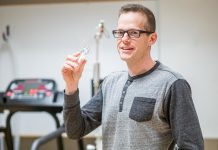Irvine, California - February 2003 - Boosting insulin with vitamins C and E may improve the drug's effectiveness for treating diabetes. A UC Irvine College of Medicine study has found that the popular antioxidant supplements not only enhance insulin's ability to reduce blood sugar, but also lower the risks of organ damage that can occur despite insulin treatments. The study appears in the January issue of Kidney International.
Dr. Nick Vaziri, professor of medicine, and his team found that untreated diabetes raised blood pressure and increased the production of damaging oxidizing agents called free radicals. The free radicals converted sugars and proteins into harmful chemicals, increasing the risks of tissue damage often seen in untreated diabetes.
Treating the rats with insulin alone improved high blood pressure somewhat and partially spared the sugars and proteins from the free radicals' assault. But it also added a new problem, as the free radicals turned their attack on nitric oxide, a ubiquitous molecule that usually protects the body from free radicals. This new attack results in yet more toxic chemicals, with the potential to inflict damage to tissues.
Adding vitamins C and E to insulin, however, spared the sugars, proteins and nitric oxide from attack.
"Blood pressure was lowered to normal, and free radicals were not in sufficient numbers to degrade the sugars, proteins and nitric oxide," Vaziri said. "We think this shows that a diet rich in antioxidants may help diabetics prevent the devastating cardiovascular, kidney, neurological and other damage that are common complications of diabetes."
Continue Reading Below ↓↓↓
Diabetes affects nearly 17 million Americans. Insulin is the predominant treatment, but patients eventually develop complications, like various forms of heart disease and nerve, liver and kidney damage. Studies would still have to be tested in humans, but Vaziri believes that adding vitamins C and E to an insulin-dependent diabetic's diet should help treat the disease and perhaps prevent future organ damage.
Source: UC Irvine College of Medicine










